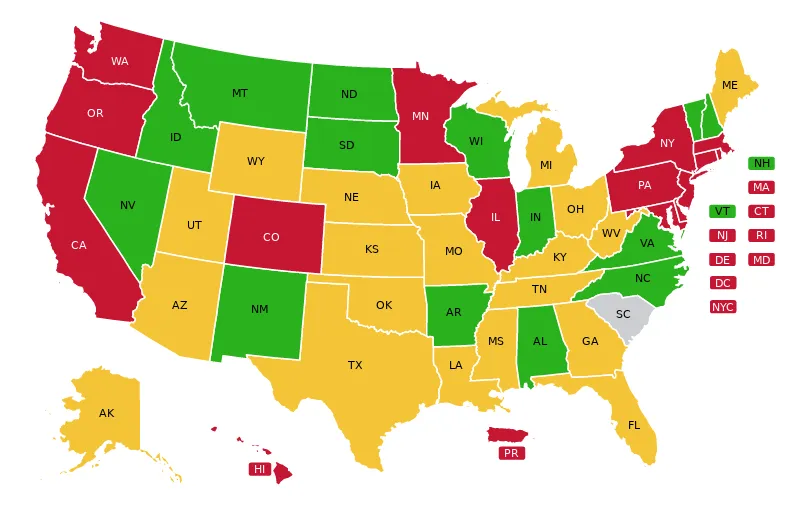Did you know that as of March 2024, South Carolina joined the ranks of states that have adopted constitutional carry laws? This legislative change allows individuals to carry firearms without the need for a Concealed Weapons Permit (CWP).
In recent years, the conversation surrounding gun rights and concealed carry laws has intensified across the United States.
South Carolina, known for its rich history and vibrant culture, has also made headlines with its legislation regarding the Second Amendment and the carrying of firearms.
Let’s look into what South Carolina constitutional carry law demands, its implications, and the broader context of gun rights within the state.
Eligibility Requirements for Constitutional Carry
To be eligible for constitutional carry in South Carolina, individuals must meet certain criteria as pointed out in the state’s laws.
You must be at least 21 years old to carry a handgun without a permit in South Carolina. You can’t have any felony convictions or certain misdemeanor convictions, such as domestic violence offenses, on your record. You mustn’t have been adjudicated as mentally incompetent or have been voluntarily or involuntarily committed to a mental institution.
According to Denver gun crime lawyer Jason Wareham, if you meet these criteria, you can lawfully carry a handgun in public places in South Carolina without a permit. Still, you must understand the responsibility that comes with carrying a firearm, including knowing when and where you’re allowed to carry, and being aware of the laws governing the use of force in self-defense situations.
Always stay informed and updated on the regulations to make sure you’re complying with the law while using your right to carry a firearm in South Carolina.
Where Concealed Carry Is Permitted
Concealed carry is allowed in different locations across South Carolina, with certain restrictions and exceptions in place.
South Carolina allows concealed carry in most public places, including parks, roadsides, and forests. Restaurants and bars allow concealed carry unless specific signage prohibiting it is displayed in the premises. You can carry in retail stores, shopping malls, and other public areas.
On private property, concealed carry is usually allowed unless the property owner explicitly prohibits it. Respect these rules and recognize any signs indicating no firearms on the premises.
In terms of vehicles, you can carry concealed in a car without a permit, whether you own the vehicle or not.
Restrictions on Carrying Firearms
To make sure that you are not violating the law, you must understand the multiple restrictions that apply to carrying firearms in South Carolina.
You’re prohibited from carrying a firearm on school property, including K-12 schools and college campuses, unless authorized by the governing body of the school or institution.
Restrictions in carrying a firearm apply in government buildings, courthouses, polling places on election days, and places where federal law prohibits firearms.
Private property owners have the right to restrict or prohibit firearms on their premises, so always respect any posted signage indicating such restrictions.
Individuals under the age of 21 aren’t permitted to carry firearms in most cases, unless they’re on their own property or in their own home.
Reciprocity Agreements With Other States
South Carolina recognizes reciprocity agreements with other states regarding the carrying of firearms. This means that if you have a valid concealed carry permit from a state that South Carolina has a reciprocity agreement with, you may legally carry your firearm in South Carolina.
Reciprocity agreements typically outline which states’ permits South Carolina recognizes and vice versa. You must understand that while South Carolina may honor permits from certain states, the laws governing where and how you can carry your firearm may differ.
Thoroughly research the specific terms of the reciprocity agreements to avoid any legal issues while carrying your firearm in South Carolina.
Implications for Law Enforcement and Public Safety
Law enforcement officers must know the varying laws across different states to make sure they can enforce regulations and respond to incidents involving individuals carrying firearms.
With South Carolina’s constitutional carry law, law enforcement may encounter more armed citizens during routine interactions, requiring heightened vigilance and communication skills to de-escalate situations safely.
Another key consideration is the safety of the public as the presence of more armed individuals in public spaces can impact overall community safety. There should be a focus on responsible gun ownership and handling to address concerns about potential misuse or accidents resulting from the increased access to firearms under constitutional carry.
It becomes imperative for both law enforcement and the general public to prioritize safety, training, and communication to prevent misunderstandings and guarantee a secure environment for all citizens.
Conclusion
Understanding South Carolina’s constitutional carry law is necessary for residents who wish to legally carry firearms. Being aware of reciprocity agreements with other states and the implications for law enforcement and public safety can help promote responsible gun ownership and usage.






